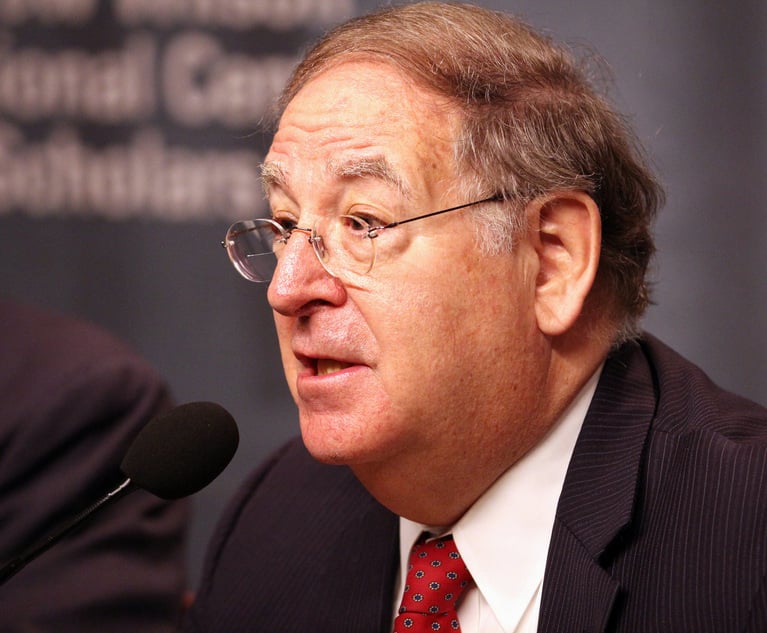Lawyers Spar Over Trump Tax Return FOIA Suit at DC Circuit
At least one D.C. Circuit judge appeared skeptical of the DOJ argument that EPIC, the advocacy group seeking Trump's tax returns, hadn't completed its Freedom of Information Act request.
September 13, 2018 at 03:33 PM
3 minute read
 President Donald Trump listens during a meeting with members of Congress in the Cabinet Room of the White House in Washington, D.C., on July 17. Photographer: Yuri Gripas/Bloomberg
President Donald Trump listens during a meeting with members of Congress in the Cabinet Room of the White House in Washington, D.C., on July 17. Photographer: Yuri Gripas/Bloomberg
A U.S. Department of Justice lawyer told a D.C. appeals court Thursday that an advocacy group seeking President Donald Trump's tax returns hadn't “perfected” its open records request, but at least one judge on the panel appeared skeptical.
Attorneys for the advocacy group Electronic Privacy Information Center and the DOJ sparred before the three-judge panel on the U.S. Court of Appeals for the D.C. Circuit, as part of EPIC's continued bid to force the IRS to hand over Trump's tax returns. U.S. District Judge James Boasberg of the District of Columbia tossed its Freedom of Information Act lawsuit last year, a ruling Epic appealed.
Michael Murray, a DOJ lawyer who argued on behalf of the IRS, urged the panel to keep the lower court ruling intact, insisting EPIC had not exhausted all remedies when it sought Trump's tax returns through a Freedom of Information Act request.
But Judge Patricia Millett bristled at what she described as the IRS' effort to shift the burden to EPIC in establishing its case for the release of the tax returns. When Murray stated the IRS normally requires requesters to explain their right to certain kinds of information, Millett responded that FOIA was the very source of an individual's right to agency documents. The exception, she emphasized, was if there were an exemption that applied.
If the appeals court rules in EPIC's favor, it would revive the group's lawsuit against the IRS, which could compel the agency to consider its records request. That, however, would not necessarily force the agency to hand over Trump's tax returns.
Circuit Judges Karen LeCraft Henderson and Harry Edwards also sat on the panel, where Trump's past misstatements about the IRS and his taxes fell under the spotlight. Trump has not released his tax returns to the public citing an ongoing IRS audit, a move that breaks precedent with presidents going back to Richard Nixon.
As a then-presidential candidate in 2016, Trump suggested the IRS was unfairly targeting him, and particularly his political views and religion, through those audits. As president-elect, amid public interest in any financial relationship Trump had with Russia, Trump also repeatedly denied having any financial “deal” with Russia—an assertion later clarified by Trump's tax lawyers.
Trump's words “impugn the credibility of the IRS” and the IRS “has the ability to correct that record,” John Davisson, counsel for EPIC, said Thursday.
If the appeals court rules in EPIC's favor, it would revive the group's lawsuit against the IRS, which could compel the agency to consider its records request. That, however, would not necessarily force the agency to release Trump's tax returns.
Read more:
Senators Press Kavanaugh Over Kozinski Clerkship, Loyalty, Personal Debt & More
House Committee to Take Up Measure to Reconfigure the Ninth Circuit
This content has been archived. It is available through our partners, LexisNexis® and Bloomberg Law.
To view this content, please continue to their sites.
Not a Lexis Subscriber?
Subscribe Now
Not a Bloomberg Law Subscriber?
Subscribe Now
NOT FOR REPRINT
© 2025 ALM Global, LLC, All Rights Reserved. Request academic re-use from www.copyright.com. All other uses, submit a request to [email protected]. For more information visit Asset & Logo Licensing.
You Might Like
View All
Quinn Emanuel Files Countersuit Against DOJ in Row Over Premerger Reporting
3 minute read
'Thoughtful Jurist': Maryland US District Senior Judge Messitte Dies After Short Illness
4 minute read
'Religious Discrimination'?: 4th Circuit Revives Challenge to Employer Vaccine Mandate
2 minute read
4th Circuit Revives Racial Harassment Lawsuit Against North Carolina School District
3 minute readTrending Stories
- 1'A Death Sentence for TikTok'?: Litigators and Experts Weigh Impact of Potential Ban on Creators and Data Privacy
- 2Bribery Case Against Former Lt. Gov. Brian Benjamin Is Dropped
- 3‘Extremely Disturbing’: AI Firms Face Class Action by ‘Taskers’ Exposed to Traumatic Content
- 4State Appeals Court Revives BraunHagey Lawsuit Alleging $4.2M Unlawful Wire to China
- 5Invoking Trump, AG Bonta Reminds Lawyers of Duties to Noncitizens in Plea Dealing
Who Got The Work
J. Brugh Lower of Gibbons has entered an appearance for industrial equipment supplier Devco Corporation in a pending trademark infringement lawsuit. The suit, accusing the defendant of selling knock-off Graco products, was filed Dec. 18 in New Jersey District Court by Rivkin Radler on behalf of Graco Inc. and Graco Minnesota. The case, assigned to U.S. District Judge Zahid N. Quraishi, is 3:24-cv-11294, Graco Inc. et al v. Devco Corporation.
Who Got The Work
Rebecca Maller-Stein and Kent A. Yalowitz of Arnold & Porter Kaye Scholer have entered their appearances for Hanaco Venture Capital and its executives, Lior Prosor and David Frankel, in a pending securities lawsuit. The action, filed on Dec. 24 in New York Southern District Court by Zell, Aron & Co. on behalf of Goldeneye Advisors, accuses the defendants of negligently and fraudulently managing the plaintiff's $1 million investment. The case, assigned to U.S. District Judge Vernon S. Broderick, is 1:24-cv-09918, Goldeneye Advisors, LLC v. Hanaco Venture Capital, Ltd. et al.
Who Got The Work
Attorneys from A&O Shearman has stepped in as defense counsel for Toronto-Dominion Bank and other defendants in a pending securities class action. The suit, filed Dec. 11 in New York Southern District Court by Bleichmar Fonti & Auld, accuses the defendants of concealing the bank's 'pervasive' deficiencies in regards to its compliance with the Bank Secrecy Act and the quality of its anti-money laundering controls. The case, assigned to U.S. District Judge Arun Subramanian, is 1:24-cv-09445, Gonzalez v. The Toronto-Dominion Bank et al.
Who Got The Work
Crown Castle International, a Pennsylvania company providing shared communications infrastructure, has turned to Luke D. Wolf of Gordon Rees Scully Mansukhani to fend off a pending breach-of-contract lawsuit. The court action, filed Nov. 25 in Michigan Eastern District Court by Hooper Hathaway PC on behalf of The Town Residences LLC, accuses Crown Castle of failing to transfer approximately $30,000 in utility payments from T-Mobile in breach of a roof-top lease and assignment agreement. The case, assigned to U.S. District Judge Susan K. Declercq, is 2:24-cv-13131, The Town Residences LLC v. T-Mobile US, Inc. et al.
Who Got The Work
Wilfred P. Coronato and Daniel M. Schwartz of McCarter & English have stepped in as defense counsel to Electrolux Home Products Inc. in a pending product liability lawsuit. The court action, filed Nov. 26 in New York Eastern District Court by Poulos Lopiccolo PC and Nagel Rice LLP on behalf of David Stern, alleges that the defendant's refrigerators’ drawers and shelving repeatedly break and fall apart within months after purchase. The case, assigned to U.S. District Judge Joan M. Azrack, is 2:24-cv-08204, Stern v. Electrolux Home Products, Inc.
Featured Firms
Law Offices of Gary Martin Hays & Associates, P.C.
(470) 294-1674
Law Offices of Mark E. Salomone
(857) 444-6468
Smith & Hassler
(713) 739-1250










